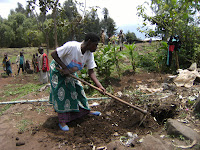Since my first Growing Together workshops, I have always given seeds to the participants. They are lightweight, inexpensive, relevant to the work and straightforwardly symbolic. Even when I give enough for several packets per participant, they are opened, wondered at, sometimes sniffed, and shared around. For the first of the Twa villages the groups devised a system whereby a responsible person would be designated to share out the remaining seeds fairly after the sacks had been planted by people's houses.
When we returned for the second week, we heard rumours that seed had not been fairly shared. Was it the fault of the responsible person elected by the group? Arriving at the fourth village, adjacent to the first, Solange was approached by several members of the first group to ask me for extra seeds. She learned the story. While the responsible person was at school, a participant had approached his wife, who handed over the packets. And despite repeated protestations he was keeping them all for himself. I had no spare seeds with me; I arranged with Solange that she could take fresh supplies next month to the follow up day, to give to those who had kept their word and bought a sack.
This week's work is with two groups in the same resettlement village. Today was the first day for the second group. Other groups have settled quickly after the introductions to the first task – revising the lessons from the HROC workshop about trust and mistrust, trauma and trauma healing. These were restless. Soon the cause of their agitation was revealed. Two of the sacks planted the day before had been stolen in the night. This village is a long way from anywhere else – it had to be neighbours who had stolen from neighbours. What could be done to stop it happening again? Was it even worth carrying on with the practical work of preparing and planting the sacks if they would also be stolen?
The shock and loss were traumatic, if on a small scale. We agreed to discuss the problem in the afternoon, once people had had a chance to talk it through. Our team of three were clear we needed to model the good listening promoted as a tool for healing. An exercise from Joanna Macy's work on 'Despair and empowerment' came into my head. We could invite anybody who wanted to express their feelings about the outrage to do so and all the rest of us would affirm the speaker with 'Indeed, it is so' or something similar. I don't know why that didn't happen, but instead there was a conversation about whether the thief should be handed over to the authorities for punishment when found, or whether there should be an internal community process of discussion and reparation – a kind of Gacaca.
We moved on to planning for the next day's work – planting in small groups at one chosen house for each group. In previous workshops the decision had been made on practical grounds – who lived close enough together for the trainers to move between houses. Here all the houses were close together, with identical facilities. Dividing into groups and then cooperating had proved a difficult concept to convey. Last week, also, we had to get the four householders to stand and then direct each 'team' to stand together in a different corner of the room. Eventually this time we got to four groups with five women in each. Now to decide which house to go to. One group settled quickly while the others thrashed about, getting noisier and noisier, babies and mothers alike.
Solange tried to impose order by shouting. Hopeless. After checking with Rachel, I suggested a version of a technique I've sometimes used or been part of. In Quaker circles it's usually described simply as 'having some silence'. Here I suggested prayer, and I began, asking for guidance and a spirit of cooperation. Rachel translated, then added some words of her own. We waited for perhaps a minute.
Now please would they go back into the groups, then come and sit quietly upholding the others once they had decided. One more group found agreement, two still failed. Exhaustion was apparent. We would go home and hope for something better by tomorrow. On the way out of the village, we briefed Jean Claude, the community leader.
[Returning on Thursday, we caught up on the story. J-C rearranged the groups Solange had arbitrarily imposed, separating family members known to make trouble. The sanction he suggested was that we would work only with the groups who had agreed a location. They would then teach the others, after we'd left, when they were ready to work together. His strategy worked.
The women told us they had felt bad when we left while they were quarreling. J-C said he'd asked each new group to base themselves at the house of the person who was finding it hardest to accept the situation, on the grounds that this was the person with most to learn about cooperation and they should start with her.]

Caption: Rachel (l) and Solange at work once we get going

Caption: Some of our onlookers
Later, in the restaurant as we wait for our food, fits of laughter seize my three companions – Rachel, translator and fellow gardener, Solange N, the HROC facilitator who has worked most with the Twa, and Edouard, the Yearly Meeting driver loaned to us for the HROC car. I wait in hope of a translation. 'We know it's sad and serious, but isn't it ridiculous that men should get up in the night to steal as sack full of earth and stones! Do they think they'll find riches resulting from the touch of a white person's hand?'














